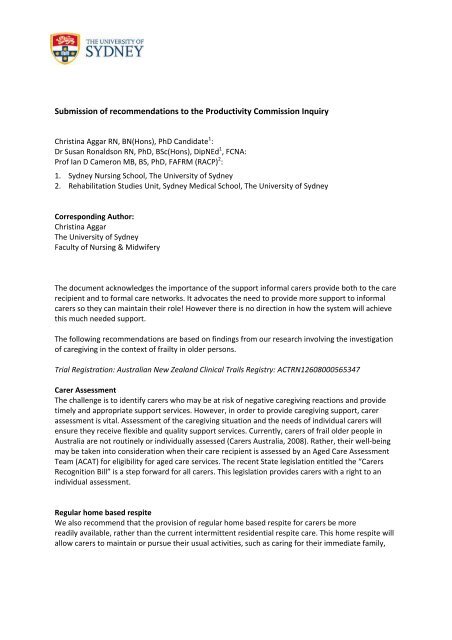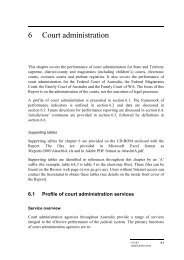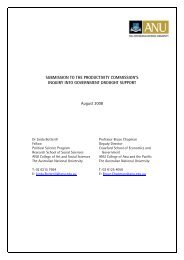Christina Aggar, Dr Susan Ronaldson and Prof Ian Cameron (PDF ...
Christina Aggar, Dr Susan Ronaldson and Prof Ian Cameron (PDF ...
Christina Aggar, Dr Susan Ronaldson and Prof Ian Cameron (PDF ...
Create successful ePaper yourself
Turn your PDF publications into a flip-book with our unique Google optimized e-Paper software.
Submission of recommendations to the Productivity Commission Inquiry<br />
<strong>Christina</strong> <strong>Aggar</strong> RN, BN(Hons), PhD C<strong>and</strong>idate 1 :<br />
<strong>Dr</strong> <strong>Susan</strong> <strong>Ronaldson</strong> RN, PhD, BSc(Hons), DipNEd 1 , FCNA:<br />
<strong>Prof</strong> <strong>Ian</strong> D <strong>Cameron</strong> MB, BS, PhD, FAFRM (RACP) 2 :<br />
1. Sydney Nursing School, The University of Sydney<br />
2. Rehabilitation Studies Unit, Sydney Medical School, The University of Sydney<br />
Corresponding Author:<br />
<strong>Christina</strong> <strong>Aggar</strong><br />
The University of Sydney<br />
Faculty of Nursing & Midwifery<br />
The document acknowledges the importance of the support informal carers provide both to the care<br />
recipient <strong>and</strong> to formal care networks. It advocates the need to provide more support to informal<br />
carers so they can maintain their role! However there is no direction in how the system will achieve<br />
this much needed support.<br />
The following recommendations are based on findings from our research involving the investigation<br />
of caregiving in the context of frailty in older persons.<br />
Trial Registration: Australian New Zeal<strong>and</strong> Clinical Trails Registry: ACTRN12608000565347<br />
Carer Assessment<br />
The challenge is to identify carers who may be at risk of negative caregiving reactions <strong>and</strong> provide<br />
timely <strong>and</strong> appropriate support services. However, in order to provide caregiving support, carer<br />
assessment is vital. Assessment of the caregiving situation <strong>and</strong> the needs of individual carers will<br />
ensure they receive flexible <strong>and</strong> quality support services. Currently, carers of frail older people in<br />
Australia are not routinely or individually assessed (Carers Australia, 2008). Rather, their well‐being<br />
may be taken into consideration when their care recipient is assessed by an Aged Care Assessment<br />
Team (ACAT) for eligibility for aged care services. The recent State legislation entitled the “Carers<br />
Recognition Bill” is a step forward for all carers. This legislation provides carers with a right to an<br />
individual assessment.<br />
Regular home based respite<br />
We also recommend that the provision of regular home based respite for carers be more<br />
readily available, rather than the current intermittent residential respite care. This home respite will<br />
allow carers to maintain or pursue their usual activities, such as caring for their immediate family,
employment, social commitments <strong>and</strong> relaxation. Currently, residential respite care <strong>and</strong> financial<br />
assistance are the main government initiative to support carers. However, only 27% of carers eligible<br />
to receive respite (i.e. their care recipient has been assessed by an ACAT) have taken up the support<br />
of the service (Australian Institute of Health <strong>and</strong> Welfare, 2009) with only small numbers of carers<br />
satisfied with the service (Parker, Mills, & Abbey, 2008). Our experience suggests that respite is<br />
usually offered or taken up when a caregiving situation has reached crisis <strong>and</strong> one common reason<br />
for not utilising the service a second time is that the older person returns home confused <strong>and</strong> often<br />
incontinent, the carer is physically exhausted from visiting (usually daily, especially by a spouse) <strong>and</strong><br />
mentally drained from feelings of guilt. It would appear that respite in the form that it currently<br />
exists (residential respite) does not improve or relieve negative reactions to caregiving for most<br />
carers.<br />
Targeted health care initiatives<br />
Regular carer support services <strong>and</strong> targeted health care initiatives, particularly those that focus on<br />
carers’ health status <strong>and</strong> the promotion of positive health behaviours, may improve carer energy<br />
levels <strong>and</strong> their physical ability to provide care <strong>and</strong> they may alleviate or lessen negative reactions<br />
associated with caregiving such as depression.<br />
Carer support services after placement in a residential aged care facility <strong>and</strong> in bereavement<br />
Even when a carer can no longer care for a loved one at home their caregiving experience is not<br />
over, <strong>and</strong> carer support services may still be required. However, the carer is often forgotten by the<br />
government <strong>and</strong> health care professionals who relied upon their support to maintain the frail older<br />
person’s independence in the community. For example, an older woman caring for her husb<strong>and</strong><br />
informed us that her husb<strong>and</strong> had been admitted to a residential aged care facility, following a<br />
stroke. She was very distraught, they had known each other for 72 odd years, <strong>and</strong> had been married<br />
for 60 years. She was now alone in the family home, with a big dog, on a single pension; her carer<br />
allowance had also been terminated. She continued to visit her husb<strong>and</strong> every day, travelling there<br />
by bus; she washed his clothes <strong>and</strong> fed him most meals. Her visits would often end in tears because<br />
due to his stroke, her husb<strong>and</strong> had become abusive.<br />
As a result of our ageing society, the profile of carers of community living frail older people is greater<br />
than ever. In terms of keeping older people independent <strong>and</strong> in the community, the health <strong>and</strong> wellbeing<br />
of carers is just as important as care recipient health status. In order to keep carers healthy<br />
<strong>and</strong> well supported they require assessment of their caregiving reactions, regular carer support<br />
services <strong>and</strong> targeted health care initiatives.<br />
Australian Institute of Health <strong>and</strong> Welfare (2009) Dementia <strong>and</strong> the take‐up of residential respite<br />
care. Bulletin no. 78. Cat. no. AUS 124. Canberra: AIHW.<br />
Carers Australia (2008) Submission to the House of Representatives. Inquiry into Better Support for<br />
Carers. Canberra<br />
Parker D, Mills S & Abbey J (2008) Effectiveness of interventions that assist caregivers to support<br />
people with dementia living in the community: a systematic review, International Journal of<br />
Evidence Based Health, 6:137‐172.<br />
2
















